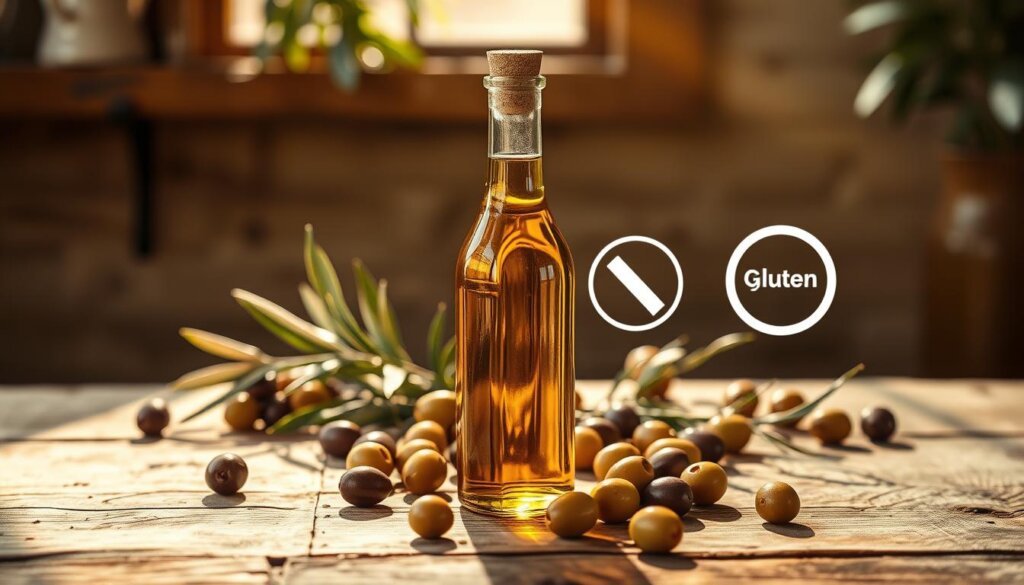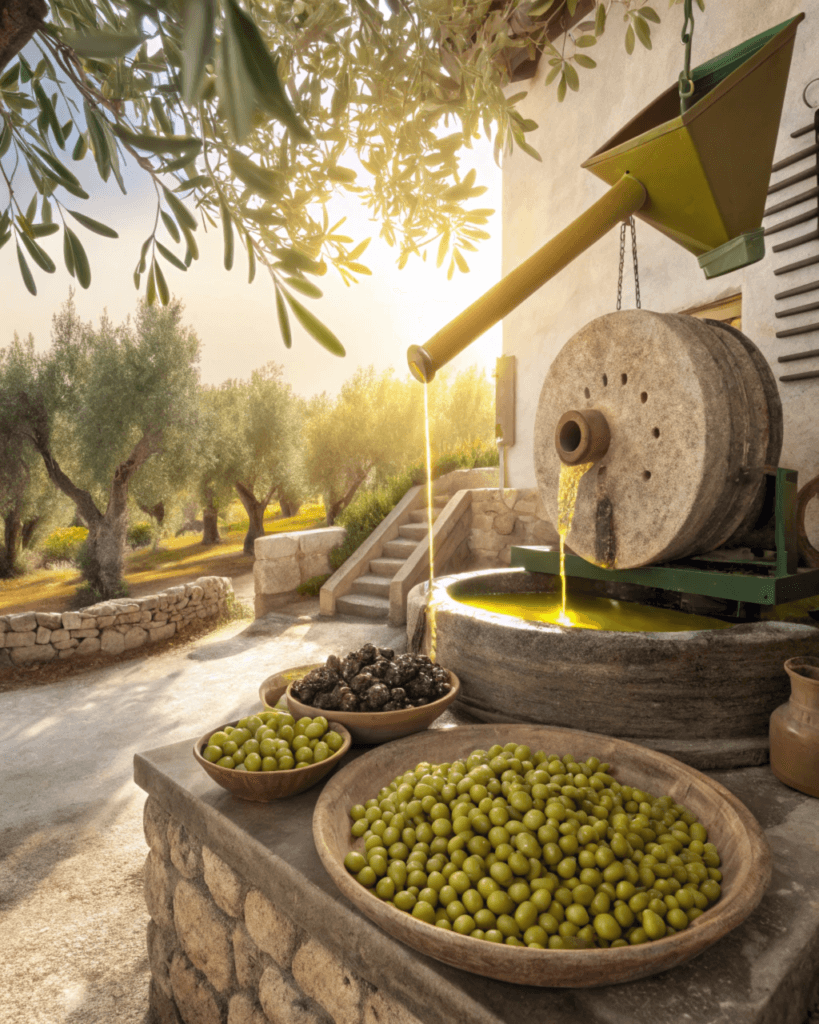Have you ever wondered if olive oil, a staple in the Mediterranean diet, could affect your gluten-free lifestyle? With more people managing gluten sensitivities and celiac disease, it’s essential to know the truth about your favorite foods.
Pure olive oil, made only from olives, is naturally gluten-free. However, the risk of gluten contamination during production or storage raises concerns.
This guide dives into the gluten-free status of olive oil, highlights potential contaminants, and offers tips for choosing safe options. Learn more about gluten-free essentials like Soybean Oil, Honey, and Hard Cider. Stay informed and make choices that let you enjoy the health perks of gluten-free olive oil worry-free.
Table of contents
Understanding Gluten and Gluten Sensitivity
It’s important to understand gluten, which is a big deal for people with dietary restrictions. Gluten is found in grains like wheat, barley, and rye. It makes dough elastic, which is good for many foods but bad for those with gluten issues.
What is Gluten?
Gluten is not one protein but a mix that can harm some people. For those with celiac disease, gluten causes an immune reaction that hurts the intestines. Symptoms can be anything from stomach problems to brain issues, so avoiding gluten is key.
Who is Affected by Gluten Sensitivity?
Many people, including those with celiac disease, are affected by gluten sensitivity. About 1 in 100 people worldwide have celiac disease, but 60-70% don’t know they do. This lack of knowledge can lead to more health problems. So, many people choose to eat gluten-free to stay healthy.

| Category | Description | Patient Impact |
|---|---|---|
| Celiac Disease | An autoimmune disorder triggered by gluten | Intestinal damage, various symptoms |
| Gluten Intolerance | Adverse reactions to gluten without celiac diagnosis | Digestive issues, fatigue |
| Gluten Sensitivity | Broader range of reactions to gluten | Symptoms can vary widely |
Is Olive Oil Gluten-Free?
Knowing if olive oil is gluten-free is key for those with gluten issues. Pure olive oil is naturally glutenless. It comes from olives, which don’t have gluten. The way olive oil extraction happens, like cold-pressing, doesn’t add gluten. So, you can enjoy it without worrying about gluten.
Why Olive Oil is Naturally Gluten-Free
Pure olive oil, like extra virgin, is great for those with gluten problems. It’s made with little processing and few additives. This keeps it gluten-free. But, always check labels, even for plain olive oil. Some flavored oils might have gluten or cause gluten contamination.
Common Misconceptions about Olive Oil and Gluten
Many think all olive oils are safe for those with gluten issues. But, flavored oils might have gluten from additives like barley. Knowing this can help you avoid gluten. Always read labels and pick products with gluten-free labels. Make sure any flavored olive oil you pick is okay for your diet.

| Olive Oil Type | Gluten-Free | Notes |
|---|---|---|
| Extra Virgin Olive Oil | Yes | Minimal processing, pure source |
| Flavored Olive Oils | Depends | Check for additives |
| Infused Olive Oils | Depends | Potential for gluten contamination |
| Refined Olive Oil | Yes | Usually gluten-free |
For more on olive oil and gluten, see this resource here. Knowing this helps you cook safely with olive oil in your gluten-free diet.
Production Methods of Olive Oil
The way olive oil is made is key to its oil quality and safety for those with gluten issues. Knowing these steps helps you pick the best oil for your cooking.
Extraction Processes: Cold-Pressing vs. Centrifugation
There are two main ways to get olive oil: cold-pressing and centrifugation. Cold-pressing keeps the natural taste and nutrients of olives, making top-notch extra virgin olive oil. It grinds olives into a paste and gets the oil without heat, keeping it gluten-free.
Centrifugation spins fast to separate oil from the paste. It’s quick and keeps the oil gluten-free. Both methods make sure the oil meets strict oil quality assurance standards.
How Production Methods Impact Gluten Content
Olive oil naturally has no gluten, but it can get contaminated during making. It’s important to know how it’s made. Brands like Iliada make sure their olive oil is glutenless and safe.
Refined oils, like pure and light olive oils, might be processed more. But they don’t have gluten. But, shared equipment can be a risk. So, choose certified gluten-free brands.

| Extraction Method | Description | Gluten-Free Status | Oil Quality |
|---|---|---|---|
| Cold-Pressing | Involves grinding olives and extracting oil without heat. | Yes | High quality, rich in nutrients |
| Centrifugation | Uses high-speed spinning to separate oil from solids. | Yes | Good quality, efficient extraction |
| Refined Olive Oil | Processed using heat and additives for flavor. | Yes | Lower quality, neutral taste |
Potential for Cross-Contamination
For people with celiac disease or severe gluten allergies, cross-contamination in olive oil production is a big worry. Knowing how olive oil is made helps you spot risks and choose wisely. Companies that care about safety use strict rules to avoid gluten.
Manufacturing Processes and Risks
When making olive oil, cross-contamination can happen if the same tools are used for both gluten and glutenless items. This is true in places that make many foods. Shared tools and lines mean more chance of gluten getting into the oil. Good makers use special lines and test for gluten.
It’s key to look for gluten-free labels. These products must have less than 20 ppm of gluten. Also, be careful with flavored olive oils, as they might have gluten. Seeing a gluten-free label means the oil is safer.
Identifying Safe Olive Oil Products
When looking for gluten-free olive oil, reading labels carefully is important. Look for gluten-free certification, which means they follow strict tests. Choose brands known for making only gluten-free oil. Pick pure or unrefined olive oil to avoid additives.
When searching for safe olive oil, check for certifications from trusted groups. These guarantees come from thorough tests and clear making practices. For more info on gluten-fre olive oil, check out this resource. It helps you make better choices.
| Product Type | Gluten-Free Status | Key Points |
|---|---|---|
| Extra Virgin Olive Oil | Gluten-Free | Made from olives, minimal risk of gluten contamination if produced correctly |
| Flavored Olive Oil | Check Labels | Watch for gluten-containing ingredients |
| Light Olive Oil | Gluten-Free | Pursues purity to avoid gluten exposure |
| Olive Oil Blends | Varies | May include gluten-containing oils, check for certifications |
Health Benefits of Gluten-Free Olive Oil
Olive oil is great for your health, even more so if you cook gluten-free. It’s full of heart-healthy fats and antioxidants. This makes it a top pick for boosting your wellness.
The Nutritional Value of Olive Oil
Olive oil is full of nutritional benefits. It has lots of monounsaturated fats. These fats are good for your heart and help reduce inflammation.
This oil is key to the Mediterranean diet. It’s also very flexible in cooking. You can find olive oil in different types, like extra virgin, virgin, and pure. Each type has its own flavor and uses:
| Type of Olive Oil | Acidity Level | Flavor Profile | Best Uses |
|---|---|---|---|
| Extra Virgin | Less than 0.8% | Rich and robust | Dipping, dressings |
| Virgin | Up to 2% | Mild | Cooking, sautéing |
| Pure | Varies | Lighter | Baking, frying |
| Light | N/A | Very mild | High-heat cooking |
Olive Oil in a Gluten-Free Diet
Olive oil is naturally glutenless. It’s a tasty and safe choice for those with gluten issues. It adds flavor and heart-healthy fats to your meals.
You can use olive oil in many ways. For example, baking with gluten-free flours, pan-frying, or making salad dressings.
Brands like Brightland and California Olive Ranch offer high-quality gluten-free olive oil. Always ask about oil handling when eating out to avoid gluten contamination. Using olive oil in a glutenless diet lets you enjoy its many nutritional benefits.
Conclusion
Pure olive oil is naturally gluten-free. It’s made only from olives, without any gluten. This makes it safe for people with gluten sensitivities or celiac disease.
Knowing how olive oil is made is key. It helps avoid cross-contamination. Also, pure olive oil is different from flavored ones. Always check labels to make sure it’s gluten-free.
Glutenless olive oil adds flavor to your food. It’s also good for your heart and reduces inflammation. Use it in salad dressings, marinades, or as a drizzle. It’s a great choice for a gluten-free diet.
FAQ
Is all olive oil gluten-free?
Yes, pure olive oil is gluten-free. It comes from olives, which don’t have gluten. But, flavored olive oils might have gluten from additives or contamination. Always check the labels.
What should I look for on olive oil labels to ensure it’s glutenless?
Look for gluten-free statements and certifications on the label. Also, choose products labeled as pure or unrefined. This helps avoid gluten contamination.
Can olive oil be contaminated with gluten during production?
Yes, gluten contamination can happen during making. This is more likely in places that handle both gluten-free and gluten products. Always ask for gluten-free certifications to be sure.
What extraction methods are used for olive oil?
Olive oil is mainly made through cold-pressing and centrifugation. Both methods are gluten-free. They don’t add gluten to the oil.
Are there health benefits to using olive oil in a gluten-free diet?
Olive oil is great for your health. It has good fats and antioxidants. These help your heart and reduce inflammation. It’s a key part of a healthy, gluten-free diet, perfect for Mediterranean dishes.
How can I use olive oil in my gluten-free cooking?
Use olive oil in many glutenless dishes. It’s great in salad dressings, marinades, and for sautéing veggies. Its rich taste and healthy fats make your meals better.
Does extra virgin olive oil have gluten?
No, extra virgin olive oil is naturally glutenless.
What oil is not gluten-free?
Most oils are gluten-free, but flavored or blended oils may contain gluten additives or cross-contamination. Always check the label.
Is Bertolli olive oil gluten-free?
Yes, Bertolli olive oil is gluten-free and safe for celiacs.
Are olives safe for celiacs?
Yes, plain olives are naturally gluten-free. However, flavored or marinated olives may contain gluten additives, so it’s important to verify the ingredients.





